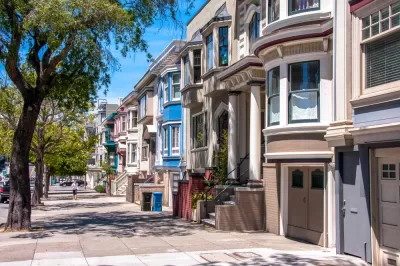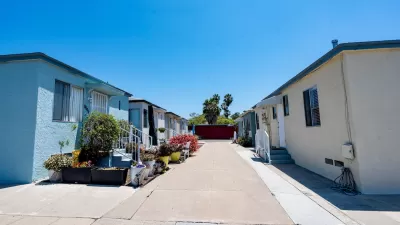As the housing crisis continues, advocates are increasingly wary of historic preservation efforts that serve to perpetuate historic inequities and keep housing costs high.

San Francisco’s St. Francis Wood neighborhood was just added to the National Register of Historic Places, making it much more difficult to build projects, reports Benjamin Schneider in the San Francisco Examiner. Housing advocates decry the move as a NIMBY action to prevent development in the area.
The historic designation makes the neighborhood exempt from SB9, SB10, and SB35, all state bills that allow for higher-density construction in an effort to alleviate the state’s housing crisis and undo decades of exclusionary and racist policies. “If you are preserving structures with the requirement that they remain single-family homes forever, when the origin of that single-family home was so Black people and Japanese people and Chinese people could not live there, is that really what you want to preserve?” asks Annie Fryman, a housing policy expert working for Abodu.
Activists worry that more communities will follow suit. “Already, wealthy communities from Palo Alto to Pasadena have tried to skirt SB 9, the statewide duplex law, by creating historic districts.”
“Fryman thinks there could have been a middle ground where the streets, parks and monuments of St. Francis Wood could have earned a historic designation but not the houses, which she describes as a ‘jumbling and sort of incoherent mix of 25 disparate revival styles.’”
While Fryman acknowledges that all neighborhoods can be precious to their residents, “If we historically preserve every neighborhood in San Francisco, we will be taking an enormous step backward, both in terms of equity and racial outcomes, and our housing crisis.”
Related Stories:
FULL STORY: St. Francis Wood earns historic designation, sparks backlash

Maui's Vacation Rental Debate Turns Ugly
Verbal attacks, misinformation campaigns and fistfights plague a high-stakes debate to convert thousands of vacation rentals into long-term housing.

Planetizen Federal Action Tracker
A weekly monitor of how Trump’s orders and actions are impacting planners and planning in America.

In Urban Planning, AI Prompting Could be the New Design Thinking
Creativity has long been key to great urban design. What if we see AI as our new creative partner?

King County Supportive Housing Program Offers Hope for Unhoused Residents
The county is taking a ‘Housing First’ approach that prioritizes getting people into housing, then offering wraparound supportive services.

Researchers Use AI to Get Clearer Picture of US Housing
Analysts are using artificial intelligence to supercharge their research by allowing them to comb through data faster. Though these AI tools can be error prone, they save time and housing researchers are optimistic about the future.

Making Shared Micromobility More Inclusive
Cities and shared mobility system operators can do more to include people with disabilities in planning and operations, per a new report.
Urban Design for Planners 1: Software Tools
This six-course series explores essential urban design concepts using open source software and equips planners with the tools they need to participate fully in the urban design process.
Planning for Universal Design
Learn the tools for implementing Universal Design in planning regulations.
planning NEXT
Appalachian Highlands Housing Partners
Mpact (founded as Rail~Volution)
City of Camden Redevelopment Agency
City of Astoria
City of Portland
City of Laramie





























